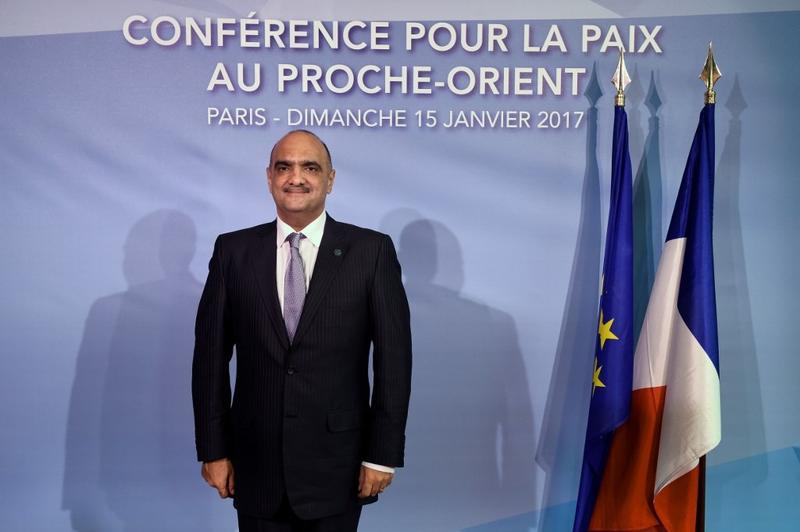 In this Jan 15, 2017 photo, then Jordanian Foreign Minister Bisher al-Khasawneh poses as he arrives for the Mideast peace conference in Paris, France. Jordan's King Abdullah appointed Khasawneh as Jordan's prime minister on Oct 7, 2020. (BERTRAND GUAY / POOL / AFP)
In this Jan 15, 2017 photo, then Jordanian Foreign Minister Bisher al-Khasawneh poses as he arrives for the Mideast peace conference in Paris, France. Jordan's King Abdullah appointed Khasawneh as Jordan's prime minister on Oct 7, 2020. (BERTRAND GUAY / POOL / AFP)
AMMAN - Jordan's King Abdullah appointed on Wednesday veteran diplomat and palace aide Bisher al-Khasawneh as the country's new prime minister, days after accepting the resignation of Omar al-Razzaz, the royal palace said.
The monarch dissolved parliament on Sept 27 at the end of its four-year term, a move that under constitutional rules meant the government had to resign within a week.
In a letter of designation, King Abdullah said he entrusted Bisher al-Khasawneh, who has been a palace advisor since last year after a career mostly spent as a diplomat and peace negotiator with Israel, to form a cabinet of qualified ministers who would rise to the country's challenges
In a letter of designation, the monarch said he entrusted British educated Khasawneh, who has been a palace advisor since last year after a career mostly spent as a diplomat and peace negotiator with Israel, to form a cabinet of qualified ministers who would rise to the country's challenges.
"The formation of this government comes at an exceptional time," the monarch said, referring to the fast spread of the coronavirus pandemic. He said the new government should boost capacity in the healthcare system amid medical fears it could collapse if community spread gets out of control.
King Abdullah said citizens' health and wellbeing is the top priority, which demands that the government continue to take all carefully studied measures to deal with the pandemic, in a manner that balances healthcare considerations with operating economic sectors and safeguarding citizens' livelihoods, Xinhua reports.
ALSO READ: Jordan's King Abdullah accepts resignation of prime minister
Khasawneh will oversee a parliamentary election due on Nov 10 whose outcome is expected under an electoral law that marginalizes the Islamist opposition to maintain a majority of pro-government deputies.
The country is facing a peak in COVID-19 infections at a time of rising popular discontent over worsening economic conditions and curbs on public freedoms under emergency laws.
The king said despite the ramifications of the COVID-19 crisis, it has revealed points of strength and promising potential in several sectors, especially food processing, pharmaceutical, and medical supplies industries, Xinhua reports.
"This potential must be capitalized on through an institutionalized, implementable approach that identifies opportunities, in order to create job opportunities and enable Jordan to play a key role as a regional hub," King Abdullah said.
Jordan's economy is expected to shrink by 6 percent this year as the country of 10 million grapples with its worst economic crisis in many years, with unemployment and poverty aggravated by the pandemic.
Unemployment hit a record 23 percent in the second quarter, while poverty has deepened in a country whose aid-dependent economy was struggling before the crisis.
Outgoing Prime Minister Omar al-Razzaz, who was appointed in 2018 to defuse the biggest protests in years over International Monetary Fund's (IMF) austerity moves, has faced growing criticism of his handling of the pandemic and his failure to combat corruption.
READ MORE: Jordan's king appoints new prime minister as protests resume
International rights groups lambasted the authorities for arresting hundreds of teacher activists after dissolving their opposition-led elected union last July.
The detention of scores of dissidents and civic activists for criticism of the government media has raised alarm over a tighter authoritarian grip, rights groups and independent politicians say.
With inputs from Xinhua


